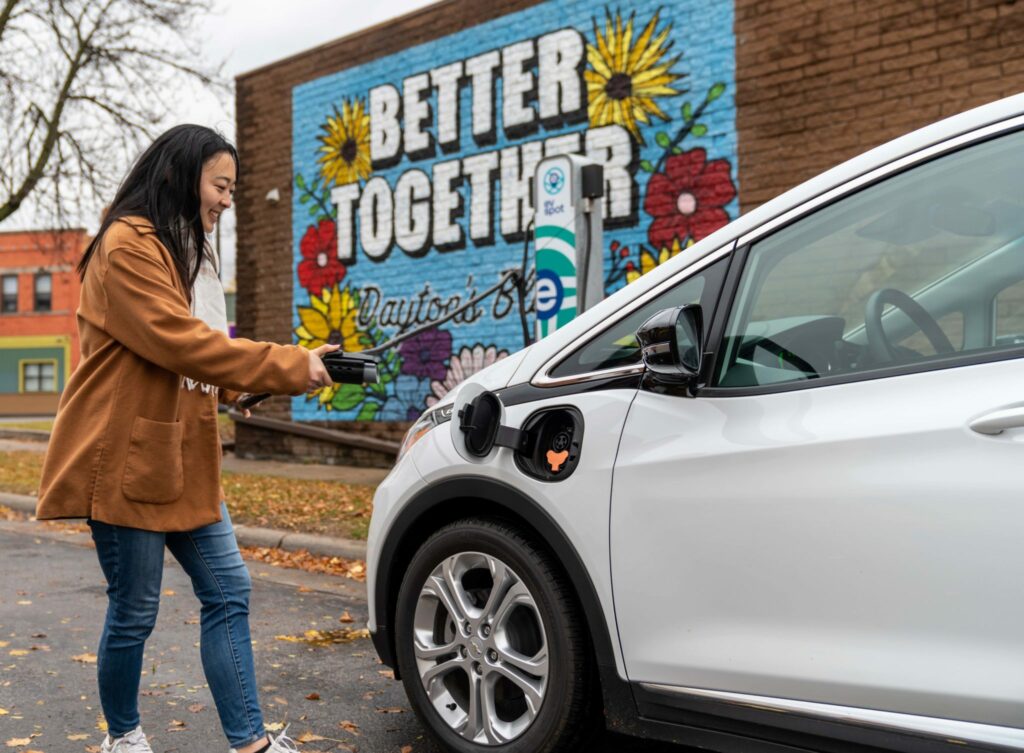Electric carshare program meets multiple needs
As the Biden administration invests in transportation electrification, the Twin Cities’ electric carshare program serves as a model for supporting the electric vehicle transition in a way that delivers affordable access to EVs for more people.
Transportation for America is part of the Coalition Helping America Rebuild and Go Electric (CHARGE). Learn about the coalition’s priorities here.

With continued federal incentives for electric vehicles and funding to build out the charger network, you would think this would be the perfect time to buy an electric car. However, pandemic-related supply chain challenges and inflation have driven the cost of new and used cars higher than ever. For many people, especially those in communities that have already historically experienced disinvestment, this presents yet another barrier to benefiting from federal investment in electric transportation.
The Twin Cities have found a way around this problem. It’s called Evie Carshare.
Evie is a point-to-point carshare program in Minneapolis and Saint Paul powered by renewable electricity. It’s a public-private partnership between the two cities, HOURCAR, Xcel Energy, East Metro Strong, and the American Lung Association. Evie currently has a fleet of 101 electric vehicles and a network of 71 charging stations and is still growing. It launched in February before funding started flowing from the 2021 infrastructure law.
The Evie Carshare program kills way more than two birds with one stone. Unlike programs that just invest in charging infrastructure or EV purchase incentives, this program addresses some of the fundamental challenges with the transition to electric vehicles:
Affordability. For people who cannot afford a car, Evie Carshare provides access to a car for those trips that really require one, even if most of the time you get around by transit, walking or biking. That not only benefits folks who cannot afford a car, but provides an option that could make it easier for a household to go car-free or cut down on the number of cars, freeing up income for other things.
The program just released a six-month report showing strong usage as the system grows. In its first six months, Evie Carshare has supported over 24 thousand trips, saving an estimated $2.5 million for users. It’s estimated that 33 percent of those savings were attributable to very low income households.
“At a time of high car and gas prices, people need options. This strong usage shows Evie Carshare is meeting a need,” said Will Schroeer, executive director of the public-private partnership East Metro Strong, a T4America member.
Supporting other modes of travel. We know that electrifying transportation is essential but insufficient to meeting greenhouse gas reduction targets. Transportation options that reduce the need to drive help us get there and also deliver equity, health, and economic benefits. On a macro-level, carshare can support vibrant, walkable cities. Studies estimate that a shared car replaces 5 to 15 personally owned vehicles. That means fewer parking lots and fewer cars on the road, leaving more space for homes, parks, and infrastructure for walking, biking, and transit. According to the six-month report, Evie Carshare has already cut an estimated 741 metric tons of carbon dioxide emissions.
Staying charged. Evie Carshare is a hybrid station-based free-floating service with charging stations located across the service area. Carshare users can start and end a trip anywhere in the 35-square mile service area; plugging the car in at a charging station at the end of your trip earns you credit. Each charging location has spots for carshare vehicles and public charging as well.
The public chargers in the network create yet another benefit: public charging access close to apartment buildings where EV owners may lack access to at-home charging. That’s likely to make EV ownership more feasible for more otherwise gasoline-fueled car drivers, particularly those on more modest incomes. Charging logistics are cited as a key barrier for people not yet committed to purchasing an EV.
As the Biden administration’s Joint Office on Energy and Transportation rolls out $2.5 billion in community charging grants over the next five years, Evie stands out as a model for investing in a ways that can accelerate the EV transition and support the administration’s Justice40 Initiative, which aims to direct 40 percent of the benefits of federal clean energy investments to disadvantaged communities.
If you live in the Twin Cities and you are thinking of buying an EV for your next car, Evie provides an opportunity to try them out and see how you like them. Surveys show that the more experience someone has with EVs, the more likely they are to choose an EV for their next vehicle purchase. Encouraging people to switch over to EVs is great. But with a carshare program and quality transit, biking, and walking options, many Evie users may learn they don’t need to purchase a car after all, which is even better.
Want more resources on how to navigate the electric vehicle transition? Check out our past blogs on this topic.




















1 Comment